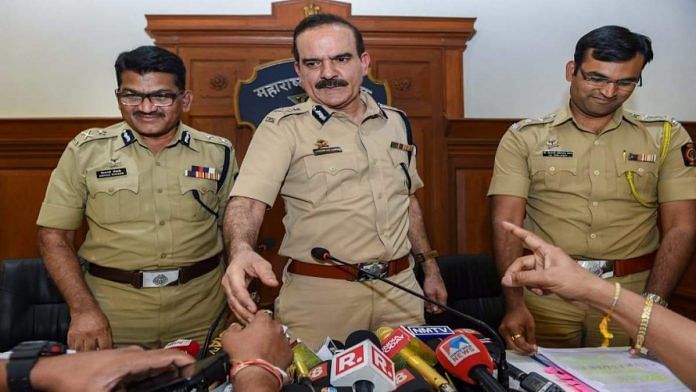The mystery behind the vehicle with gelatin sticks parked near the residence of Mukesh Ambani is yet to be unraveled but the investigation has opened a Pandora’s Box. The police have always been an exploitative arm of the government, irrespective of which political party was in power. There were times when some sections of the Mumbai police allegedly had close nexus with the underworld. But it is for the first time that allegations have surfaced of targets laid down for the police to raise funds.
These are symptoms of a total breakdown of the structure, calling for a complete systemic overhaul. Unfortunately, all concerned institutions — the political executive, the All India Services (IAS and IPS), the state legislature, Parliament and the Supreme Court — have failed in stemming the rot.
Also read: Fadnavis still wields clout in Maharashtra bureaucracy & is using it to corner Uddhav govt
The missed chances of reforms
Transfer bazars are not new. Lucrative jobs command a high price. And this loot is not just by the political masters and lobbyists but also by unscrupulous senior officers. In 2004, Anna Hazare had launched a stir against these malpractices and went on a nine-day hunger strike. The government in panic conceded Hazare’s demand for enacting a law regulating transfers but was careful to ensure that the final decisions would be of the minister concerned. Thus, the much-touted law couldn’t bring the desired change.
Another landmark in the journey for administrative reforms was the 2006 Supreme Court judgment that laid down eight guidelines to ensure, among other mandates, fixity of tenure of field officers, including the Director General of Police (DGP). It prescribed the procedure for selection of DGP that included consultation with the Union Public Service Commission to keep out political pressures. Though 14 years have elapsed, neither the Centre nor the states have implemented the judgment. Several chief ministers have, in fact, protested against this ‘interference’ by the court. The court, too, is disinclined to take any steps to haul up the Centre and the states for contempt of court. If the orders of the highest court of the land are to be disregarded on a matter so vital for upholding the rule of law, it is futile to talk of the supremacy of the Constitution.
It is against this backdrop that the decision of the Supreme Court to not entertain the petition of Param Bir Singh, former Mumbai Police Commissioner, was so disappointing. Right to constitutional remedies in Article 32 for enforcement of fundamental rights is not an alternative to Article 226 pertaining to the writ jurisdiction of the high court. Admitting Singh’s petition would have enabled the court to go into the issues fully. So a golden opportunity was lost when the Supreme Court asked the applicant to approach the Bombay High Court first.
Also read: Param Bir Singh files PIL seeking probe against Anil Deshmukh in Bombay HC
Federalism, a favourite hobby-horse
Sardar Vallabhbhai Patel had used his enormous political clout to persuade the Prime Ministers of the erstwhile Provinces and thereafter the Constituent Assembly to create the All India Services and to give them constitutional protection. But looking at the sharp decline in the performance of both the Services (IAS and IPS), it must be admitted that expectations of the founding fathers have been belied.
Reference must also be made of the N. N. Vohra committee report of 1993 that highlighted the nexus between the police, criminals and politicians.
The Supreme Court’s attention was invited to the importance of these issues in the notorious Hawala case. The court, however, decided that a standing committee under Union home secretary would be adequate to monitor such cases. This has not served any purpose. The amicus curiae had also urged the court to issue directions, inter alia, to ensure that appointments to sensitive posts and transfers therefrom were not made by the political executive. But the court stated that “the time for these drastic steps had not come. It is our hope that it never will.” Later, in 2004, Justice J. S. Verma, who had presided over the Bench, had said in deep anguish: “There was lack of needed will to avail the advantage of full autonomy and independence provided by the judiciary, because accountability of high public men had to be enforced. The very justification for judicial intervention in the Hawala case was frustrated.”
Federalism has become a favourite hobby-horse in public discourse on matters of Centre-state relations. As I have argued in my forthcoming book, India-A Federal Union of States, Fault Lines, Challenges and Opportunities, the role of the central government is being objected to, irrespective of the advantages of having all-India institutions and policies on vital subjects. One of these is the enactment of an all-India Police Act. States can make necessary changes in it to suit local conditions but the basic structure and major thrust should be the same for the whole country. However, the rhetoric of federalism has become so shrill that the central government has not even attempted to enact an all-India Police Act and has left it to the states to enact their own laws. Due to resistance of states, enactment of a law for the CBI has been pending for over six decades. These are all unmistakable signs of a bleak future. Demoralisation, demotivation and sullied public image of the entire police force, due to the actions of some rogue elements, has become a frightening reality.
The writer is a former Union home secretary and secretary, justice. Views are personal.
Edited by Anurag Chaubey
